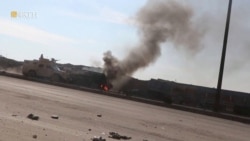A coordinated attack by Islamic State on a Kurdish-run prison in the northern Syrian city of Al-Hasakah last week has exposed the squalid conditions for detainees and put thousands of civilians at risk.
The Jan. 20, 2022, attack by Islamic State was the biggest since the militant group was defeated in Syria in 2019. Dozens of inmates — many suspected of being IS members — escaped. The attack also sparked fighting between the militants and the Kurdish-led Syrian Defense Forces who govern the area.
In response to the attacks, international forces have carried out several airstrikes near the prison, U.N. human rights spokeswoman Ravina Shamdasani said, adding the raids have put civilians in the area at risk and endangered the lives of inmates.
"We are particularly disturbed by reports that a significant number of boys, possibly several hundred, are held there and are extremely concerned for their safety and well-being," she said. "There are allegations by the SDF (Syrian Democratic Forces) that those apparently affiliated with ISIL are holding these children as human shields. We have not been able to confirm these allegations."
The large Ghweiran prison houses an estimated 5,000 male detainees, many in prolonged pretrial detention or internment. The inmates include Iraqi and Syrian nationals, as well as suspected IS fighters, also known as ISIL. Shamdasani described the prison conditions as appalling.
"We have previously warned about the squalid and insecure state of detention facilities run by the SDF, where detainees are held in overcrowded conditions, do not have access to proper medical care and cannot see their families," she said. "They are languishing in these squalid conditions over more than two years, overcrowded together. It is a recipe for violence, and it is a recipe for some kind of interruption. … It is very important that there is international attention to this situation, which is a ticking time bomb."
The United Nations also remains concerned about the situation of more than 60,000 women and children with family links to IS. They have been confined in displacement camps for years.
While most are from Syria and Iraq, thousands are from other countries. U.N. officials are urging the countries of origin to repatriate their nationals, especially women and children, in accordance with their obligations under international law.






